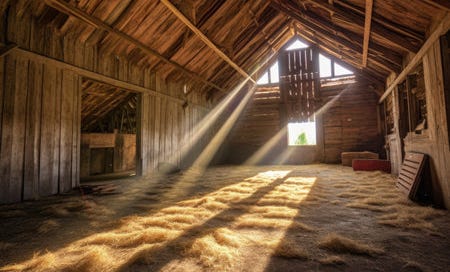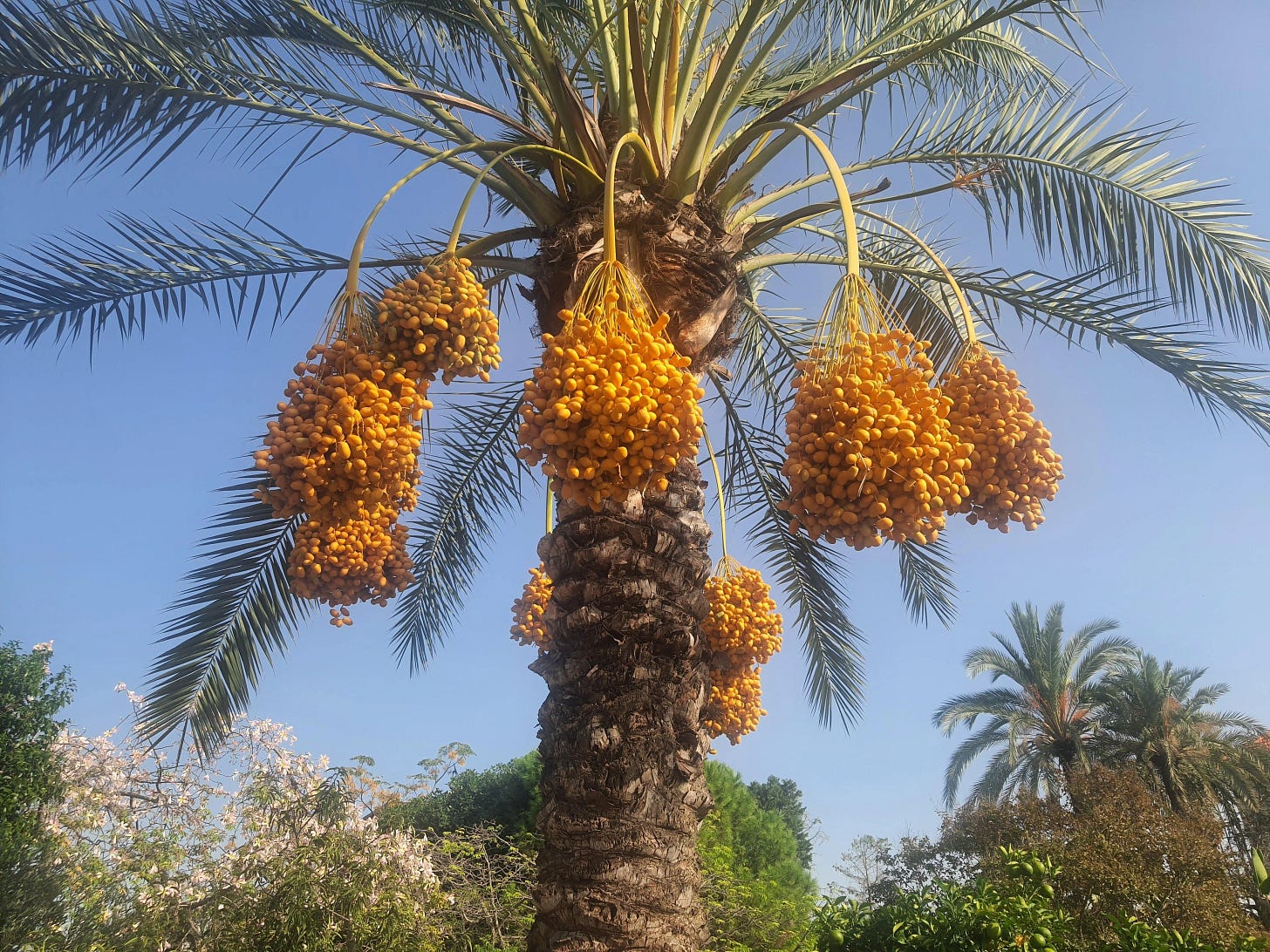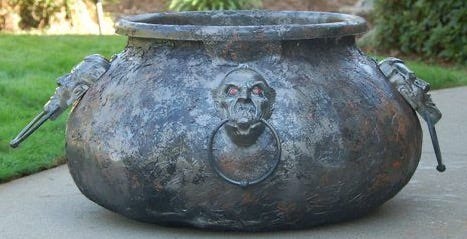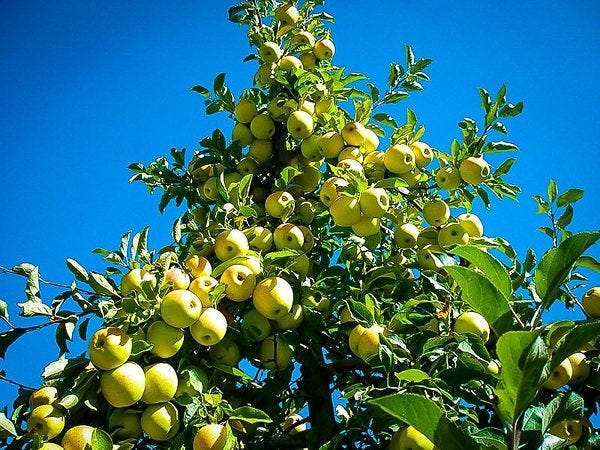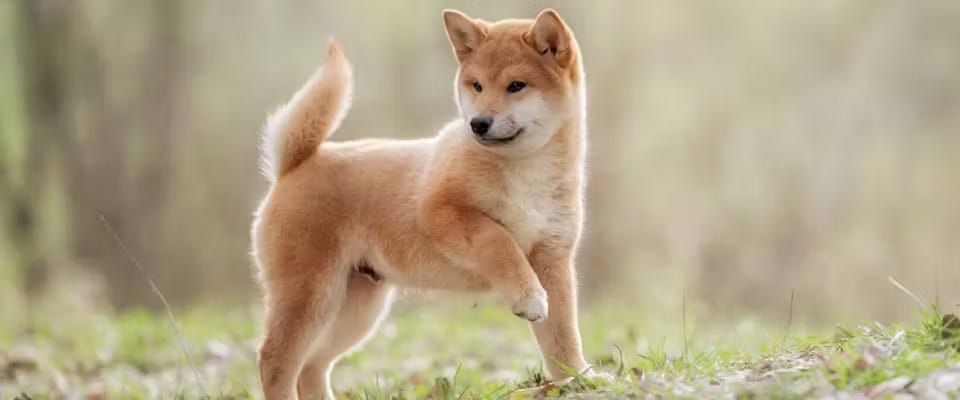Once upon a time there was a king and queen who had twelve sons, but no daughter, and it was their secret yearning to have one.
Every day they begged God to give them a daughter. And with all that begging, God obeyed and the queen became pregnant and had a daughter.
But it was a gelloudi,1 and she would get out of her cradle at night, and go to the stable, and strangle the horses, and drink their blood, and return to the cradle without anyone noticing.
Every morning the king’s men went to the stable to find yet another strangled horse, and then again the next day, and the day after that, again and again. They told the king, and he ordered guards to watch the stable and find out who was strangling the horses. And his eldest son found out, and said to his master:
“My king and master, give me your arrow and your blessing and let me go stand watch and kill this evil thing that’s eating our horses.” [The king] replied: “Go, with my blessing!” So he went, and stood watch, and waited.
Around midnight, he saw a cloud of mist, and the stable filled up with it, nobody could see past their nose. He waved the arrow around in the cloud, but [touched] nothing. At dawn once again, another strangled horse was found.
The second son heard about it, the next day he went to stand watch, but found nothing. Then the third, the fourth, and all eleven of them went in turn, but found nothing. Then the last son finally flung the arrow into the cloud and heard a cry, like the cries of a baby that cut its hand on a piece of glass. He lit a candle and went to see, he saw drops of blood, leading to the baby’s cradle.
Then the boy realised that their child was a gelloudi and was going to eat all of them after she was done with the horses. He went to tell his master and said: “Master, we must leave this place, because, here’s the truth: my sister is a gelloudi and she’ll do away with all of us.”
As soon as the eleven other brothers heard about it, they ran off, nowhere to be found. Only the king, queen, and youngest brother were left. Then, he said to them: “Come, we must leave as well, for we are lost.” The old king said: “I don’t want to leave and I’m going to stay here. I’m lost and done for anyway. You, take your mother and get away, save yourselves.”
So they took a horse for his mother to ride, and a pouch of coins and a basket of dates to eat on the road, and they left. They rode and rode, and at nightfall they reached a spring. The queen said to her son: “This is a good place to stay overnight.” So they ate the dates, and lay down to sleep.
Overnight, three date pits sprouted and became trees, big palms that shaded and cooled them when the sun came up.
After having breakfast, they loaded their things [on the horse] and rode on. At sunset they reached a tower and outside in the yard they saw forty dragons and a huge cauldron with forty ears. The dragons were struggling to move the cauldron, but they couldn’t. Then the biggest one said: “Brothers, we didn’t eat well today, because we didn’t find human meat and we lost our strength. But, I think I see a horse coming with two people , and we’ll have a good snack.”
When the prince approached, he shouted to him: “Hey, compadre2, won’t you come and help with this cauldron? We’ll give you your share.” They intended to pluck him like a chicken. He replied: “Stand aside, I don’t need your help.” And he grasped the cauldron from the two ears and moved it. And from there he said: “Stand in line so each of you gets your share of wheat.” And he shot them with his arrow and not one was left alive.
Then he said to his mother: “Let’s stay at this tower, and I’ll go hunting and bring you meat to cook, and we’ll get by. But try to gradually drag the dragons and throw them over the cliff for the crows to eat, and clean the blood and decorate the house until I get back.”
So the prince went hunting and he went, say, as far as Afiartis,3 which in the old days was another city with palaces and towers. And he brought home his catch every evening, and the queen cooked it, and they did well. But while the queen had been dragging the dragons to get rid of them and decontaminate the place, she went to sweep beneath the cauldron, and there she saw one huddled dragon hiding there.
He said to her: “At your feet and by God’s hand, my queen, don’t tell your son about me because he will kill me, let me work for you and throw me a crust.” The queen felt sorry for him and hid him from her son. During the day, the dragon did all her work for her, and at night he hid under the cauldron and nobody noticed him.
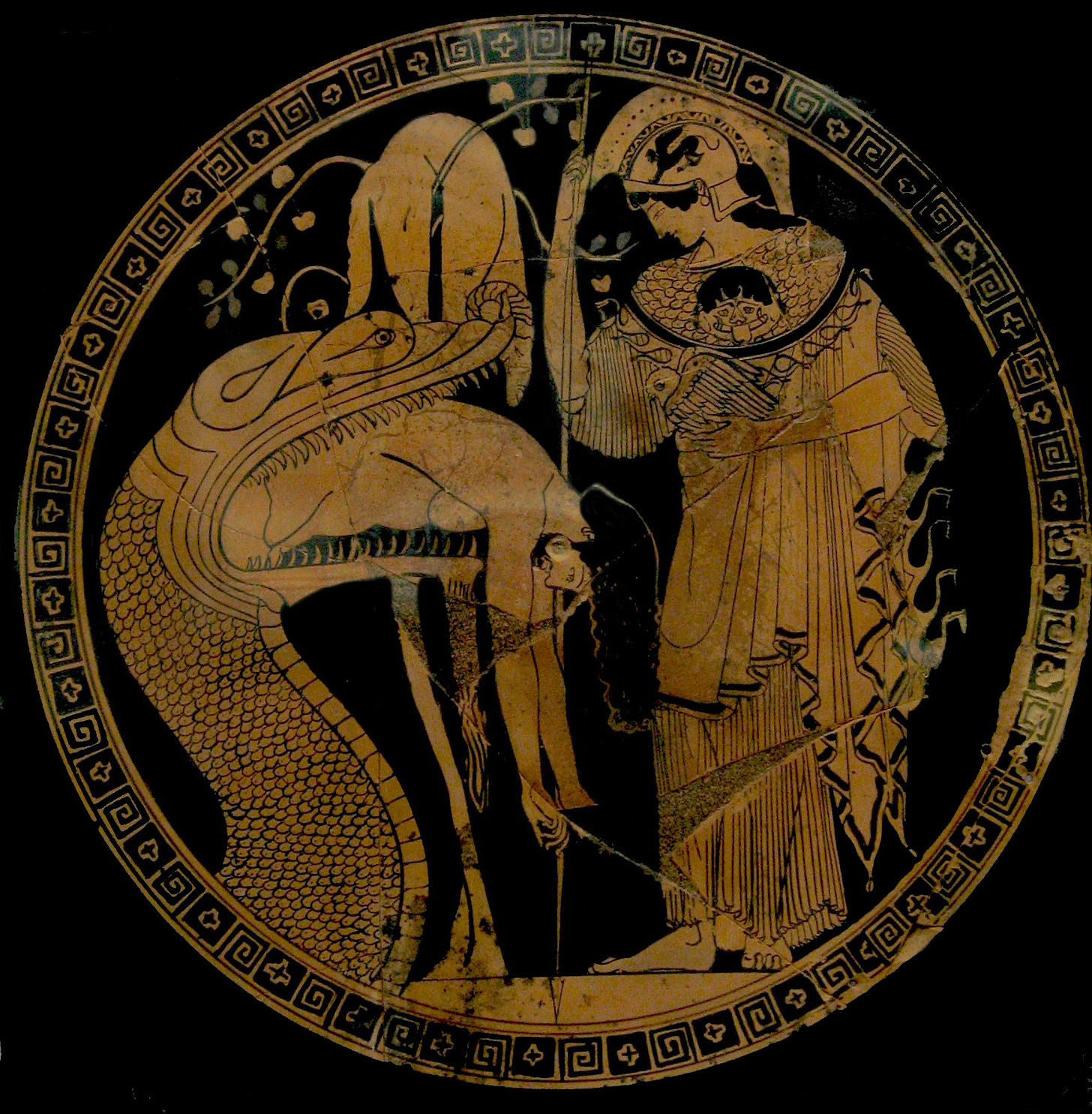
The prince would leave in the morning to go hunting and would come home late at night. He kept going to the same place, to Afiartis. It seemed he had fallen in love with some princess in that place and he told his mother he had found a match.
But love isn’t only for the young, it drives the elderly mad too. The queen got together with the dragon. Now the prince would stay overnight at his betrothed’s tower and sometimes took two or three nights to return. The queen pretended to be angry at being left alone, but it was all for show, for she had a match too, and was happy. But even so, she was afraid of the prince discovering them and killing them both in a flash.
So, they agreed to kill the prince, to enjoy life more. The dragon said to her: “Now that your son will come home, pretend to be ill, and if he asks you what’s wrong, tell him you will die if he doesn’t go to fetch the immortal water for you to drink and heal.”
When her son came home that evening, she said all this and he said: “For your sake mother, I’ll go to the ends of the earth to cure you.” And he left, and went to his betrothed.
He told her “this and this happened,” and she replied: “Go, and don’t be afraid, I’ll guide you. The immortal water is in such and such a place, like saying in Katodeio, in the Apeirite mountains, and forty dragons are guarding it. Go up to the peak with your horse, and then look: if the dragons eyes are wide open, then they’re asleep and you can go down and get the water from the basin and leave. If their eyes are closed, it means they’re awake, and you must leave, for you are lost.”
So he mounted his horse and was soon at Katodeio. For his good fortune, the dragons lay their with their eyes wide open. So he said “it is time!” and he dipped a bucket into the basin and took the immortal water, and sped away.
The water started shouting and shouting: “They’re taking me, they’re taking me!” The dragons awoke and went after him. The horse ran like the wind until they returned, reaching Afiartis and his betrothed’s tower. The young man was exhausted and wanted to rest. So his betrothed emptied out the immortal water and put it in a safe place, and replaced the water in the bucket with water from her jug.
When the prince awoke, he took it to his mother to cure her. There was nothing wrong with her, she was only play-acting to do away with her son. So when she saw him return alive from fetching the immortal water, she said: “My child, see, the immortal water has done nothing for me. If you want me to get well, for I feel my illness is getting worse, you must go and get me the immortal apples to eat, so I will get well.” And he said: “For your sake, mother.”
So off he went, and he found his betrothed and said: “This and this is happening with my mother, she’s after the immortal apples and sending me to get them.” She said: “Don’t you fear a thing. You’ll go and find forty dragons guarding the apple tree with the immortal apples. To get there, you must get through a narrow pass between two rocks that open and close. The apple tree with the apples is in a garden between the rock formations. If you can get through with your horse and the rocks don’t crush you, then you’ll get the apples and come right back. But if you’re caught in the rocks, you’re done for.”
So he left, and eventually reached the place. He went in with his horse, and over to the apple tree, found the forty dragons sleeping, picked the apples all at once, and ran back outside the garden. As he left, the rocks clashed and caught the horse’s tail, and cut off half of it. The horse wept for his beautiful, bushy tail, and the prince comforted it and said: “Don’t be sad, my little horse, I’ll care for you, and we’ll go to the tower.”
And I forgot to tell you, while the prince was picking the apples, the apple tree shouted and shouted: “They’re taking my apples! My apples!” and the dragons awoke and chased him, but he had escaped, having worked out how the rocks moved, and got through.
So, he reached his betrothed and showed her the apples. She took them again, and switched them with some other apples that resembled them, and he took those to his mother.
As soon as she saw them, she ate them and pretended to be cured and immortal! Now she realised that she couldn’t get rid of him that easily, so she told him: “Now that I’m better, you must go to our palace and find out how your poor master is, he’s an old man, and see how my daughter is, who we abandoned so young when we left.”
The deceitful woman intended to send him there so he would be eaten by the gelloudi. So the young man went back to his betrothed and told her: “My mother is sending me to our home, where the gelloudi, my sister, is, and if you see my arrow hanging and it drips three drops of blood, and if you see my dogs getting upset, release them, it means I’m in great danger.”
The prince left and went to the city where their palace once was. It was still there, but not a living soul in sight, neither masters, nor slaves, nor horses, not even a fly. The gelloudi had eaten the lot of them and had grown and chewed up the whole house, from the upper floors to the yard.
As soon as she saw him on his horse she recognised him immediately and said: “Welcome back my little brother, I’ve had nothing to eat for two or three days, what luck this is!”
Shaking with fear, he said: “Eat my horse first, and in the morning you can eat me too.” She replied: “I might as well, I’ll do you the favour.” So she came out and bit off the horse’s leg with one bite, then came inside and asked him: “How many legs, brother, does your horse have?” He said: “Four.” She said: “Oh, but I think it has three…”
Soon she ate another leg, and asked the same things, and by dawn she had eaten the whole horse and then came and asked him: “How many horses do you have, brother?”
He said: “One.”
She said: “Oh, but I think you have none!” and continued: “now it’s your time, because I’m still hungry with just one horse.”
He said: “Before you eat me, do me a favour, bring me a bucket of cold water from the well in the yard, don’t let me die thirsty.”
She said: “You see I haven’t slept all night to guard you so you don’t cut me? And now I don’t trust you.”
He replied: “If you want, bring me a cowbell and I’ll ring it so you can hear I haven’t left while you go and come back.”
“Very well,” she said.
So the prince kept ringing the cowbell and the gelloudi heard it and was content. She said “I’ve got you here all right.” When the bucket was full, she said: “I should probably wash a little, after being awake all night,” and she washed and cooled down.
And then she said, “Oh, I need a file, to sharpen my teeth a little, I haven’t sharpened them in so long so I enjoy my food better.” So while the prince kept ringing the bell for the gelloudi to hear, a short-tailed mouse heard all the noise and came out of his hole and saw the young man ringing the bell. It said: “What do you want here, young man, the gelloudi will pick your bones? Can’t you see she cut off my tail?”
The prince said “What can I do?”
The mouse said: “Tie the bell where I can reach it, and I’ll ring it for you, and you get out.” So the prince ran off and vanished.
Meanwhile, the gelloudi returned, heard the bell, but saw no-one. The mouse was hidden in his hole and rang the bell from there. In her rage the gelloudi wrecked the wall and knocked it down along with the bell. Then, she ran to eat her brother, and chased and chased him, and the mountains and hills echoed with her noise. As soon as she saw him, two-three miles away, she threw her voice: “Oh you, and where will you go? I’ll drink your blood!” And soon she had almost reached him.
When he saw the danger, he climbed up the date palm - remember the three dates he and his mother had eaten and the palms that had grown from their pits? The gelloudi came beneath them. She said: “Get down, because I’ll cut down the tree, and you’ll get hurt.” And she took a huge bite, and cut the date palm as if it were but a sapling. The prince only just jumped to the next one in time.
The gelloudi went near it and shouted “Come down!”
”I’m not coming down.” There goes the second date palm. Only one remained.
The prince saw things getting tough, and said: “Now that my end is near, just let me cry out and whistle three times and then I’ll come down for you to eat me.”
She said: “Shout and whistle all you want, you won’t escape my teeth.”
So he shouted “Lion, tiger, and my good little fox,” and whistled three times.
At that moment his betrothed saw his arrow drip three drops of blood and the dogs shaking their chains and howl. She unleashed them directly and in the blink of an eye, they were below the date palm. They said: “What are your orders, master?”
He said: “Onto the gelloudi, tear her apart!” And they lunged at her.
As they tore her apart and ate her, the cursed thing shouted: “Won’t at least a nail of mine be left? I’ll grow back and eat you!”
From the tree, the prince shouted to the dogs: “For goodness sake! Don’t even leave a nail, or a hair, nor an ear, for we’ll be done for!”
And the little fox saw that the gelloudi’s toenail had dug itself into the earth, and he dug right after it and ate that too…
Finally, the prince came down and went to his betrothed, and she barely recognised him, so fierce was he after fighting the gelloudi. Then he went to his mother and told her all his travails. That evening she chatted to the dragon, saying “For him to escape the gelloudi, he must have courage somewhere, and we must find it and cut it away.”
At dawn his mother said, “Come on, my golden son, show me your courage for me to worship and burn incense, that it has done us so much good.”
He said not a word, but as his mother insisted, he said: “Look, my courage is over there by the broom near the door. So she decorated it with ribbons and put it by the icons, and lit incense and pretended to worship it as her son’s courage.
A few days later, when her son had gone hunting, she said to the dragon: “It’s time to burn the broom on the oven, for him to lose his strength, and be eaten by beasts, and never come back.” So they threw it on the fire and thought they’d become gods, so overjoyed were they.
Late at night the prince returned, with two horses loaded with lions and tigers. And he didn’t even see a nightmare! In the morning his mother said: “Oh my golden boy, you don’t love me, why don’t you tell me where you keep your strength?” He said: “In the kerchief on the pillar.” She took the kerchief, and washed it, and ironed it, and hung it by the icons, and lit incense day and night, and worshipped it for God to protect her son and his strength.
In those days, two kings were at war and the prince went to fight with his band. Then the queen said to the dragon: “Now it’s time to see if he lied to us about his strength being in the kerchief.” They tore it to shreds, put it on the fire, and fried some eggs to eat.
Two or three days later, the prince returned, banners high, shouting in victory. “He managed to trick us again!” said the nasty woman. In the morning she turned to him, weeping and wailing, saying: “I’m now an old woman and I will die, and you won’t trust me with your secret for me to know and rejoice with my son’s bravery,” and all sorts of such flattery. The boy seemed to be moved by the sight of his mother weeping - how could he have known that she had her lover - and he told her the whole truth. He said: “On the crown of my head are three golden hairs, and those are my strength. If anyone cuts those hairs, I’m done for, I’m lost.”
Two or three days later, they sat on the balcony chatting. Then the queen said to the boy: “Come, my son, sit on my knees and let me check your head for lice, I’ll tell you a story to pass the time.” And while she pretended to check for lice, the prince dozed off, and she took a little pair of scissors from her pouch and cut the three golden hairs to the root. The prince awoke immediately, but didn’t even have the strength to stand. Then the bitch realised her son had lost his power and called the dragon, and they took a scythe and together tore him into forty pieces.
They dug a hole forty fathoms deep, they put him in a bag and threw him inside, then covered him with stones and soil. While the murder was taking place, the prince’s dogs at his betrothed’s tower were chewing at the bars [of their cage] and very disturbed. Then the girl realised that something must have happened to her beloved, and she unleashed them. They went straight to the grave and dug with their claws and cried, and ran to the girl’s tower and back again. Then the maiden went with them, saw the pit and called for help, and they dug and found the bag with the forty pieces of her fiancé.
How she wept and sobbed. Taking the bag, she took the pieces out one by one, and remade his body. Then she took the immortal water she had hidden, and poured it over him, and the pieces reconnected and the young man came back to life, as healthy as before. He put the immortal apples on his eyes and his vision returned.
All he was missing was his full strength, but day by day, the golden hairs grew back and his strength returned.
So once he had recovered, he returned to his mother’s house and found her sitting with the dragon, and each of them was rocking a child on their knees. He grabbed the same scythe they had used to chop him up, and tore his mother, the dragon, and the bastard children to pieces. And then he threw them to his dogs and they ate them in one go, and that was that.
Then he returned to his betrothed and they had their wedding, and a feast, and joy and dancing, and they had children and filled the world.
I wasn’t there, and you shouldn’t believe a word!
About this wondertale
Narrated by Evaggelia Hatzis from Othos, Karpathos. Collection of A.M. Nouarou, Folklore Miscellania of Karpathos, 1932.4
This wondertale fuses two (or three) different tales: “The cannibal sister” and “The faithless mother,” as well as the dragon-slaying hero, categorised as AT315A; AT590; and AT300 respectively in the Aarne-Thompson folktale taxonomy.
Though variants of each of these are found across Europe and Asia, they are very common in Greece, especially on the islands, and the unique Greek ecotype tends to merge them into a single narrative as seen here.
The gelloudi, or “baby gello” is a common Greek female demon encountered in folk narratives since antiquity; it is attested in ancient proverbs and very common in Byzantine narratives too. In the cast of folk characters they are related to the Lamia, Empousa, Mormo (Mormolykeia), and Avyzou, all female demons later associated with Hekate and described as ugly, misshapen women who have somehow not fulfilled their feminine destiny, either through failing to have children, or failing to raise them.
Their names and characteristics are attested as comic figures in Aristophanes, in late antique fantasy narratives, on Greco-Roman protective amulets, in patristic literature, and in commentaries from Byzantine scholars; they were often invoked to scare children (similar to the bogey-man or banshee).
Gello specifically is often called aōrē; a young woman who died before her time. Unable to fulfil her destiny as a mother, she becomes the bane of young mothers and infants; envy is often the key motivator of demons in folktales. The gelloudi is either a child of Gello, or a child born on New Year’s Day which will become a changeling unless baptised immediately; alternatively it can grow from a part of a Gello.5
In this story we have a curious inversion: the baby Gello attacks male figures while she herself is an infant; this is again a unique characteristic of the Greek ecotype. The close connection between the hero and his horse (and all the men and their horses) is a further typical motif; without the horse, the man is weakened and easily devoured.
The motif of the large, monstrous family that initially yearns for a daughter, with a weak or foolish father, demonic mother, and cowardly offspring of whom only the youngest survives and has redeeming characteristics is also very common. The mother-son dynamic echoes the Oedipus and Perseus myths; small details such as the clashing rocks draw on Homeric legends, and the date palms are common in Greece but also point to Near Eastern and North African cultural exchange.
Translation and commentary by Sasha Chaitow © 2025.
Gelloudi: Pronounced yiel-LOO-di (yiel like yell, loo like zoo, di like dim). Diminutive of Gello (pronounced yie-LO, like “spot”), a kind of female demon attested since antiquity in Greek folklore. Its name is thought to be the root for ghoul. Variants on the same name include Gyllo, Gyro, Gilo, or Gelu. She is seen and named on many apotropaic amulets from the 6th-7th centuries especially.
Compadre: in Greek Koumpare (for men) or Koumpara (for women); a familiar term of address used for non-blood relatives through marriage or christening, also used to address a stranger in a friendly way.
The story was narrated on the Greek island of Karpathos, so place names are localised to that island.
This story variant and source for some of the commentary: Anna Aggelopoulou, Greek Stories A: The Story-Daughters, Estia 2014.


